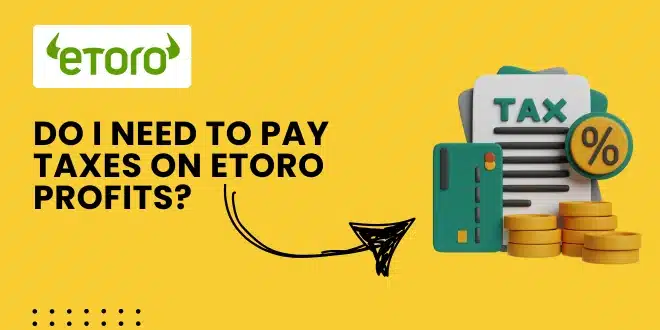You just made your first real profit on eToro. That small thrill of seeing green numbers on your portfolio feels good. But then someone asks, “Did you report that on your taxes?” And suddenly, your stomach drops.
Don’t worry—you’re not alone. Many new traders don’t realize they owe taxes on their profits, even if they didn’t withdraw the money. Let’s make it simple so you can stay confident, organized, and fully in control of your trading journey.
What Triggers Taxes on eToro?
You don’t owe taxes just because your portfolio goes up. You owe taxes when certain events happen. Here’s a quick guide:
Taxable Events:
- Selling any asset for more than you bought it
- Earning dividends from stocks or ETFs
- Getting rewards from crypto (like staking or bonuses)
- Closing profitable CopyTrader positions
Not Taxable (Yet):
- Buying and holding an asset without selling
- Watching profits grow without closing positions
- Transferring funds between your own wallets
Pro Tip: You’re usually taxed on realized profits, not paper gains—but you still need to report them.
What Tax Documents Does eToro Provide?
eToro helps you stay organized, but it doesn’t handle your taxes for you. You’re responsible for filing and paying.
Here’s what you can get from eToro:
- Annual tax report showing gains, losses, and dividends
- For U.S. users: IRS forms like 1099-B, 1099-K, and 1099-MISC
- Downloadable transaction history (for custom tracking or tools)
Pro Tip: Download your reports each January and back them up in a folder marked “Taxes.” You’ll thank yourself later.
Tax Rules Can Vary by Country
Tax laws depend on where you live, so the same trade can mean different tax bills.
- U.S.: You’re taxed on all realized gains and must file IRS forms even if profits are small
- UK: You may qualify for a capital gains allowance before tax kicks in
- Germany: Flat capital gains tax rate of about 25% applies after a basic exemption
- Australia: Capital gains tax applies, but long-term holdings may get a discount
- Canada: Profits are often taxed as capital gains, but frequent trading may be treated as income
Pro Tip: If you’re unsure, search your country’s tax authority site or speak to a local tax pro who understands crypto and investing.
What About Crypto Profits?
Crypto taxes can feel extra confusing—but they follow the same general rules.
- Sell crypto at a profit = capital gain
- Swap one crypto for another = taxable event
- Receive staking or reward tokens = treated as income
- Send crypto to your own wallet = not taxable
Pro Tip: eToro does not track cost basis across platforms. If you move crypto off eToro and sell it elsewhere, you’ll need to track your own records to calculate gain or loss.
Tools That Help You Stay Compliant
Many traders use third-party software to handle crypto and trading tax calculations. These platforms connect directly to your eToro account or allow CSV uploads:
- CoinLedger: Syncs with eToro and provides IRS-ready forms
- Koinly: Calculates taxes in 20+ countries and supports DeFi too
- Crypto Tax Calculator: Good for complex transaction histories
Pro Tip: Most tax tools have free previews, so you can test your report before paying for a full plan.
How to Prepare for Tax Season Like a Pro
You don’t need to dread tax season. Start now, and it becomes a simple habit.
Step-by-step prep:
- Download your eToro tax report in January
- Export your full transaction history quarterly
- Label your crypto transfers (deposit, reward, trade, etc.)
- Use a spreadsheet or tax tool to track profits and losses
- Save all receipts, notes, or confirmations in a folder
- Pro Tip: Set a calendar reminder for tax deadlines based on your country—and file early to reduce stress.
FAQs
1. Do I need to pay taxes on profits from eToro? Yes, most countries treat eToro profits as taxable income or capital gains.
2. Does eToro withhold taxes automatically? No, eToro doesn’t withhold any tax. It’s your job to report and pay it.
3. What tax documents does eToro give me? Annual tax reports, plus 1099 forms for U.S. users (1099-B, 1099-K, 1099-MISC).
4. Do I have to report crypto trades? Yes, crypto gains and income like staking rewards are usually taxable.
5. Are CopyTrader profits taxed? Yes, they’re treated the same as regular trades and taxed when you close a profitable position.
6. Can I reduce my tax bill by reporting losses? Yes, in most countries you can offset losses against gains to reduce what you owe.
7. Do I still report trades if I didn’t withdraw money? Yes, taxes are based on trades you closed, not whether you withdrew funds.
8. What if I live outside the U.S.? Check your local tax laws—most countries tax trading profits, even on foreign platforms like eToro.
9. Is there a free tool I can use to track eToro profits? Yes, tools like Koinly and CoinLedger have free versions and CSV upload support.
10. What happens if I don’t report my eToro gains? You could face penalties or audits later. It’s safer to report everything and pay only what you owe.


